Business Law: Analysis of the UK Legal System - BMP4002
VerifiedAdded on 2023/06/07
|9
|2458
|436
Report
AI Summary
This report provides a detailed analysis of the UK legal system, beginning with a definition of law and an overview of the UK's common law system. It explores the classifications of law, differentiating between civil and criminal law with examples, and explains the roles of the High Court and Supreme Court. The report further examines the sources of law, including case law and legislation, and discusses delegated legislation. Finally, it delves into UK employment law, outlining statutory duties of employers and differentiating between wrongful and unfair dismissal actions. The report concludes that the UK legal system provides significant protections to its citizens and plays a crucial role in the country's economic growth. Desklib offers this and many other solved assignments for students.
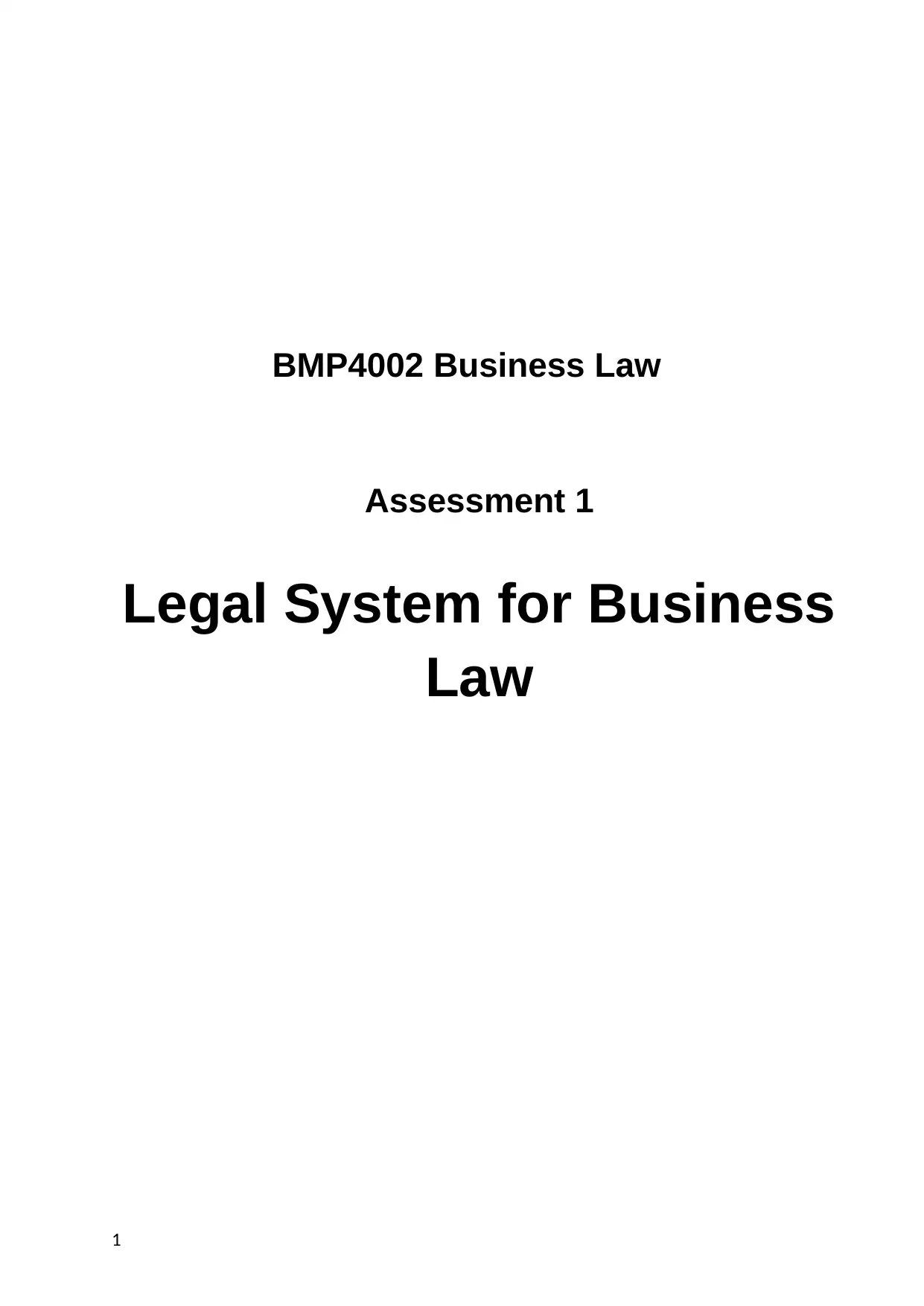
BMP4002 Business Law
Assessment 1
Legal System for Business
Law
1
Assessment 1
Legal System for Business
Law
1
Paraphrase This Document
Need a fresh take? Get an instant paraphrase of this document with our AI Paraphraser
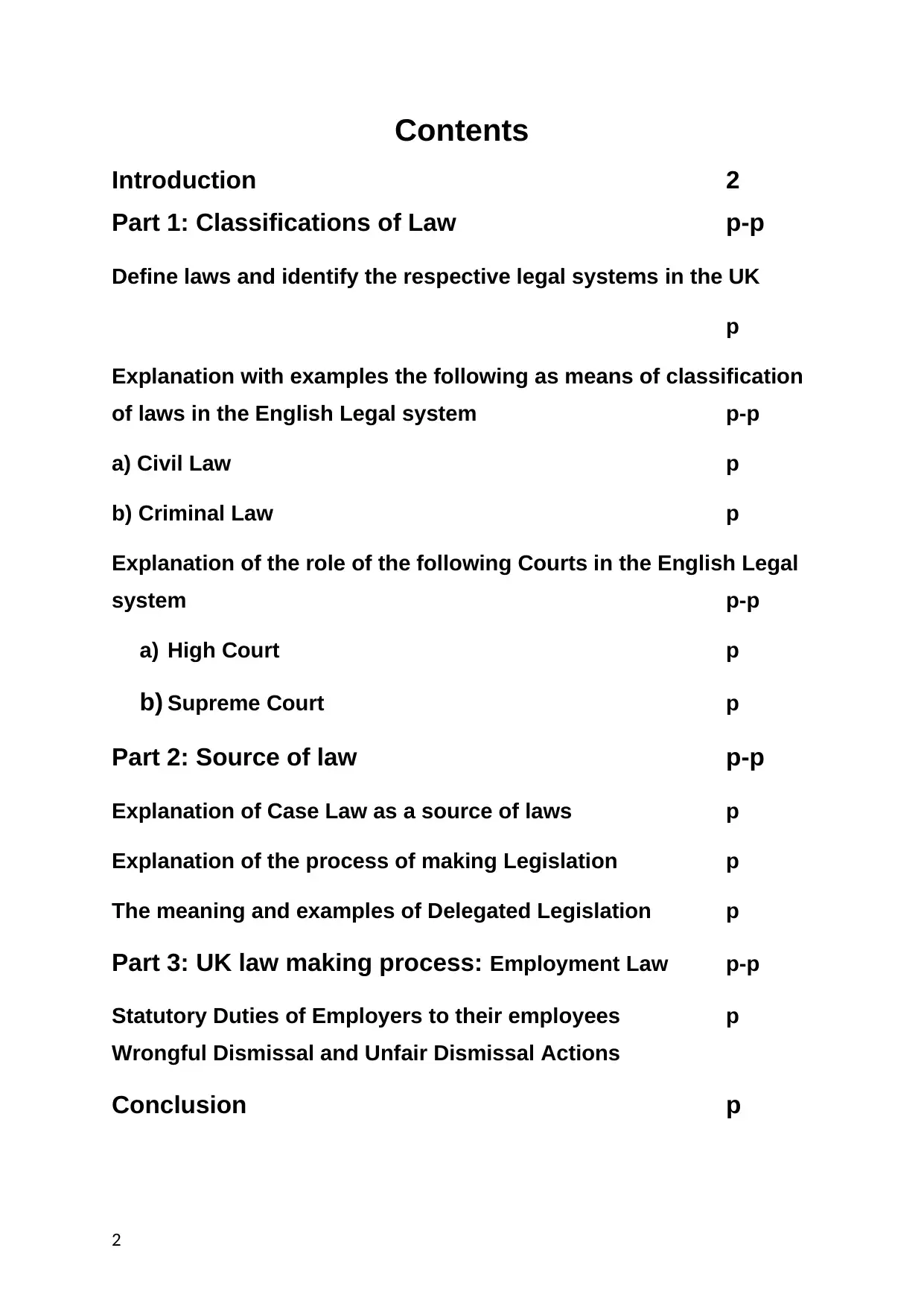
Contents
Introduction 2
Part 1: Classifications of Law p-p
Define laws and identify the respective legal systems in the UK
p
Explanation with examples the following as means of classification
of laws in the English Legal system p-p
a) Civil Law p
b) Criminal Law p
Explanation of the role of the following Courts in the English Legal
system p-p
a) High Court p
b) Supreme Court p
Part 2: Source of law p-p
Explanation of Case Law as a source of laws p
Explanation of the process of making Legislation p
The meaning and examples of Delegated Legislation p
Part 3: UK law making process: Employment Law p-p
Statutory Duties of Employers to their employees p
Wrongful Dismissal and Unfair Dismissal Actions
Conclusion p
2
Introduction 2
Part 1: Classifications of Law p-p
Define laws and identify the respective legal systems in the UK
p
Explanation with examples the following as means of classification
of laws in the English Legal system p-p
a) Civil Law p
b) Criminal Law p
Explanation of the role of the following Courts in the English Legal
system p-p
a) High Court p
b) Supreme Court p
Part 2: Source of law p-p
Explanation of Case Law as a source of laws p
Explanation of the process of making Legislation p
The meaning and examples of Delegated Legislation p
Part 3: UK law making process: Employment Law p-p
Statutory Duties of Employers to their employees p
Wrongful Dismissal and Unfair Dismissal Actions
Conclusion p
2

3
⊘ This is a preview!⊘
Do you want full access?
Subscribe today to unlock all pages.

Trusted by 1+ million students worldwide
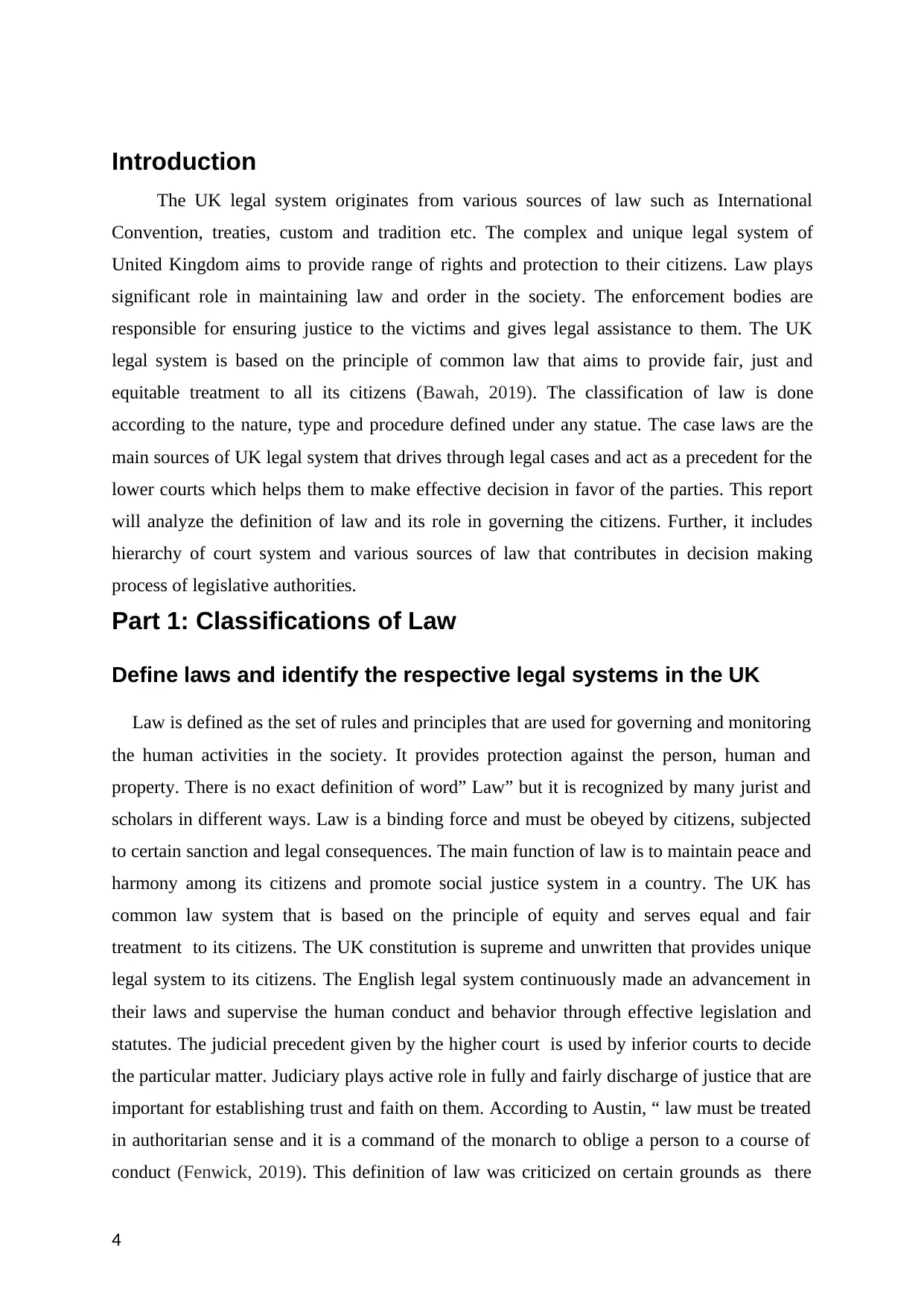
Introduction
The UK legal system originates from various sources of law such as International
Convention, treaties, custom and tradition etc. The complex and unique legal system of
United Kingdom aims to provide range of rights and protection to their citizens. Law plays
significant role in maintaining law and order in the society. The enforcement bodies are
responsible for ensuring justice to the victims and gives legal assistance to them. The UK
legal system is based on the principle of common law that aims to provide fair, just and
equitable treatment to all its citizens (Bawah, 2019). The classification of law is done
according to the nature, type and procedure defined under any statue. The case laws are the
main sources of UK legal system that drives through legal cases and act as a precedent for the
lower courts which helps them to make effective decision in favor of the parties. This report
will analyze the definition of law and its role in governing the citizens. Further, it includes
hierarchy of court system and various sources of law that contributes in decision making
process of legislative authorities.
Part 1: Classifications of Law
Define laws and identify the respective legal systems in the UK
Law is defined as the set of rules and principles that are used for governing and monitoring
the human activities in the society. It provides protection against the person, human and
property. There is no exact definition of word” Law” but it is recognized by many jurist and
scholars in different ways. Law is a binding force and must be obeyed by citizens, subjected
to certain sanction and legal consequences. The main function of law is to maintain peace and
harmony among its citizens and promote social justice system in a country. The UK has
common law system that is based on the principle of equity and serves equal and fair
treatment to its citizens. The UK constitution is supreme and unwritten that provides unique
legal system to its citizens. The English legal system continuously made an advancement in
their laws and supervise the human conduct and behavior through effective legislation and
statutes. The judicial precedent given by the higher court is used by inferior courts to decide
the particular matter. Judiciary plays active role in fully and fairly discharge of justice that are
important for establishing trust and faith on them. According to Austin, “ law must be treated
in authoritarian sense and it is a command of the monarch to oblige a person to a course of
conduct (Fenwick, 2019). This definition of law was criticized on certain grounds as there
4
The UK legal system originates from various sources of law such as International
Convention, treaties, custom and tradition etc. The complex and unique legal system of
United Kingdom aims to provide range of rights and protection to their citizens. Law plays
significant role in maintaining law and order in the society. The enforcement bodies are
responsible for ensuring justice to the victims and gives legal assistance to them. The UK
legal system is based on the principle of common law that aims to provide fair, just and
equitable treatment to all its citizens (Bawah, 2019). The classification of law is done
according to the nature, type and procedure defined under any statue. The case laws are the
main sources of UK legal system that drives through legal cases and act as a precedent for the
lower courts which helps them to make effective decision in favor of the parties. This report
will analyze the definition of law and its role in governing the citizens. Further, it includes
hierarchy of court system and various sources of law that contributes in decision making
process of legislative authorities.
Part 1: Classifications of Law
Define laws and identify the respective legal systems in the UK
Law is defined as the set of rules and principles that are used for governing and monitoring
the human activities in the society. It provides protection against the person, human and
property. There is no exact definition of word” Law” but it is recognized by many jurist and
scholars in different ways. Law is a binding force and must be obeyed by citizens, subjected
to certain sanction and legal consequences. The main function of law is to maintain peace and
harmony among its citizens and promote social justice system in a country. The UK has
common law system that is based on the principle of equity and serves equal and fair
treatment to its citizens. The UK constitution is supreme and unwritten that provides unique
legal system to its citizens. The English legal system continuously made an advancement in
their laws and supervise the human conduct and behavior through effective legislation and
statutes. The judicial precedent given by the higher court is used by inferior courts to decide
the particular matter. Judiciary plays active role in fully and fairly discharge of justice that are
important for establishing trust and faith on them. According to Austin, “ law must be treated
in authoritarian sense and it is a command of the monarch to oblige a person to a course of
conduct (Fenwick, 2019). This definition of law was criticized on certain grounds as there
4
Paraphrase This Document
Need a fresh take? Get an instant paraphrase of this document with our AI Paraphraser
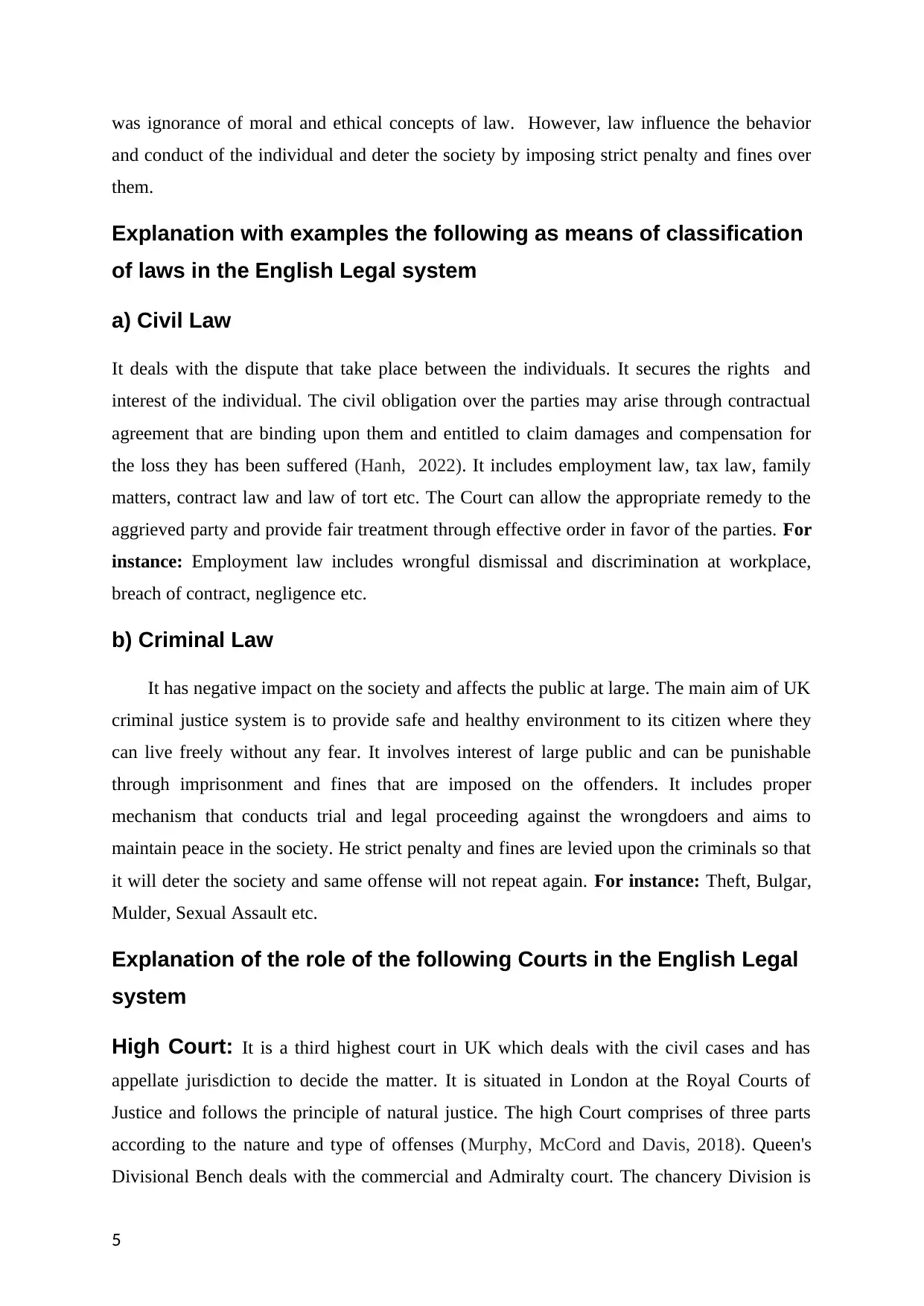
was ignorance of moral and ethical concepts of law. However, law influence the behavior
and conduct of the individual and deter the society by imposing strict penalty and fines over
them.
Explanation with examples the following as means of classification
of laws in the English Legal system
a) Civil Law
It deals with the dispute that take place between the individuals. It secures the rights and
interest of the individual. The civil obligation over the parties may arise through contractual
agreement that are binding upon them and entitled to claim damages and compensation for
the loss they has been suffered (Hanh, 2022). It includes employment law, tax law, family
matters, contract law and law of tort etc. The Court can allow the appropriate remedy to the
aggrieved party and provide fair treatment through effective order in favor of the parties. For
instance: Employment law includes wrongful dismissal and discrimination at workplace,
breach of contract, negligence etc.
b) Criminal Law
It has negative impact on the society and affects the public at large. The main aim of UK
criminal justice system is to provide safe and healthy environment to its citizen where they
can live freely without any fear. It involves interest of large public and can be punishable
through imprisonment and fines that are imposed on the offenders. It includes proper
mechanism that conducts trial and legal proceeding against the wrongdoers and aims to
maintain peace in the society. He strict penalty and fines are levied upon the criminals so that
it will deter the society and same offense will not repeat again. For instance: Theft, Bulgar,
Mulder, Sexual Assault etc.
Explanation of the role of the following Courts in the English Legal
system
High Court: It is a third highest court in UK which deals with the civil cases and has
appellate jurisdiction to decide the matter. It is situated in London at the Royal Courts of
Justice and follows the principle of natural justice. The high Court comprises of three parts
according to the nature and type of offenses (Murphy, McCord and Davis, 2018). Queen's
Divisional Bench deals with the commercial and Admiralty court. The chancery Division is
5
and conduct of the individual and deter the society by imposing strict penalty and fines over
them.
Explanation with examples the following as means of classification
of laws in the English Legal system
a) Civil Law
It deals with the dispute that take place between the individuals. It secures the rights and
interest of the individual. The civil obligation over the parties may arise through contractual
agreement that are binding upon them and entitled to claim damages and compensation for
the loss they has been suffered (Hanh, 2022). It includes employment law, tax law, family
matters, contract law and law of tort etc. The Court can allow the appropriate remedy to the
aggrieved party and provide fair treatment through effective order in favor of the parties. For
instance: Employment law includes wrongful dismissal and discrimination at workplace,
breach of contract, negligence etc.
b) Criminal Law
It has negative impact on the society and affects the public at large. The main aim of UK
criminal justice system is to provide safe and healthy environment to its citizen where they
can live freely without any fear. It involves interest of large public and can be punishable
through imprisonment and fines that are imposed on the offenders. It includes proper
mechanism that conducts trial and legal proceeding against the wrongdoers and aims to
maintain peace in the society. He strict penalty and fines are levied upon the criminals so that
it will deter the society and same offense will not repeat again. For instance: Theft, Bulgar,
Mulder, Sexual Assault etc.
Explanation of the role of the following Courts in the English Legal
system
High Court: It is a third highest court in UK which deals with the civil cases and has
appellate jurisdiction to decide the matter. It is situated in London at the Royal Courts of
Justice and follows the principle of natural justice. The high Court comprises of three parts
according to the nature and type of offenses (Murphy, McCord and Davis, 2018). Queen's
Divisional Bench deals with the commercial and Admiralty court. The chancery Division is
5
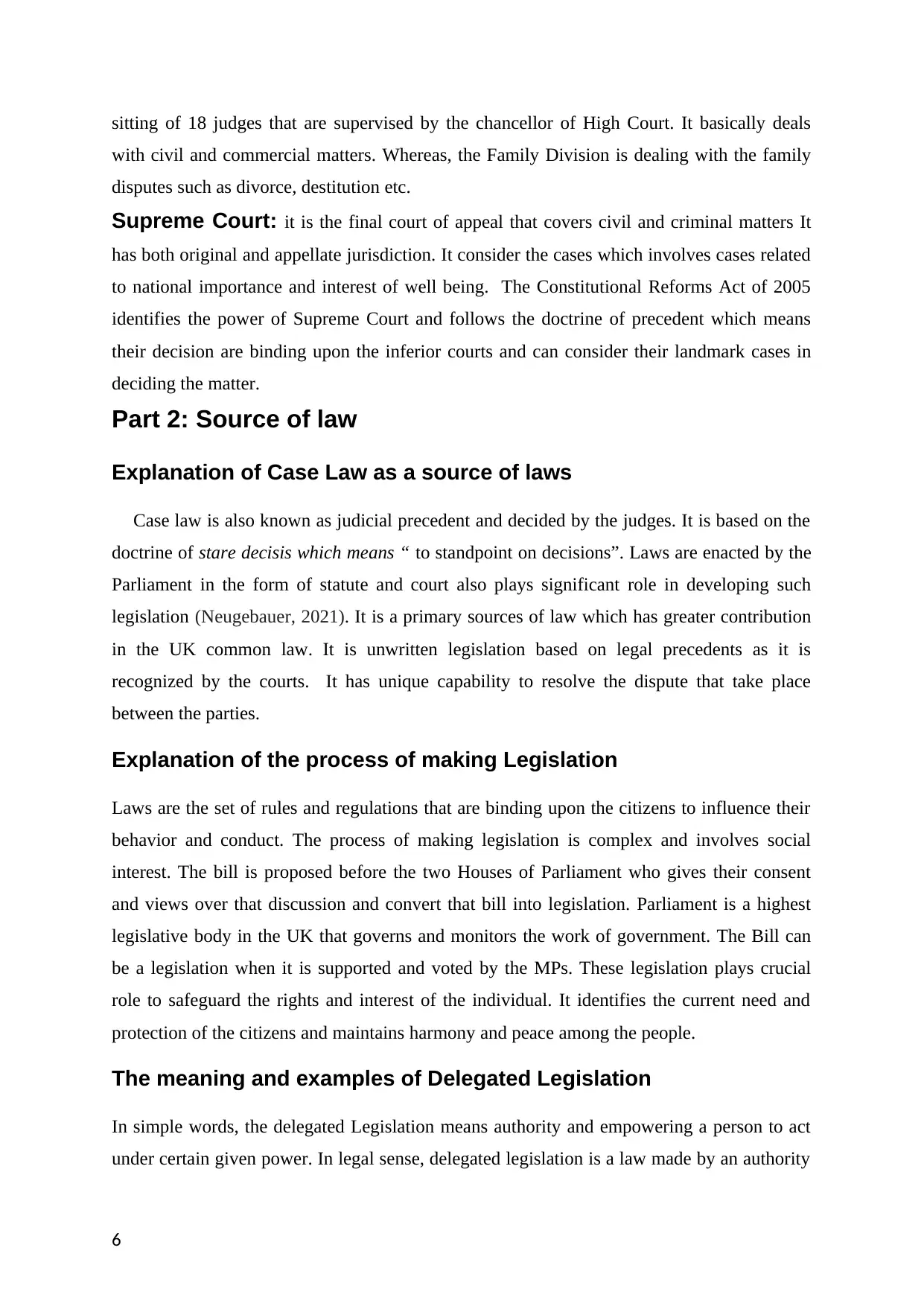
sitting of 18 judges that are supervised by the chancellor of High Court. It basically deals
with civil and commercial matters. Whereas, the Family Division is dealing with the family
disputes such as divorce, destitution etc.
Supreme Court: it is the final court of appeal that covers civil and criminal matters It
has both original and appellate jurisdiction. It consider the cases which involves cases related
to national importance and interest of well being. The Constitutional Reforms Act of 2005
identifies the power of Supreme Court and follows the doctrine of precedent which means
their decision are binding upon the inferior courts and can consider their landmark cases in
deciding the matter.
Part 2: Source of law
Explanation of Case Law as a source of laws
Case law is also known as judicial precedent and decided by the judges. It is based on the
doctrine of stare decisis which means “ to standpoint on decisions”. Laws are enacted by the
Parliament in the form of statute and court also plays significant role in developing such
legislation (Neugebauer, 2021). It is a primary sources of law which has greater contribution
in the UK common law. It is unwritten legislation based on legal precedents as it is
recognized by the courts. It has unique capability to resolve the dispute that take place
between the parties.
Explanation of the process of making Legislation
Laws are the set of rules and regulations that are binding upon the citizens to influence their
behavior and conduct. The process of making legislation is complex and involves social
interest. The bill is proposed before the two Houses of Parliament who gives their consent
and views over that discussion and convert that bill into legislation. Parliament is a highest
legislative body in the UK that governs and monitors the work of government. The Bill can
be a legislation when it is supported and voted by the MPs. These legislation plays crucial
role to safeguard the rights and interest of the individual. It identifies the current need and
protection of the citizens and maintains harmony and peace among the people.
The meaning and examples of Delegated Legislation
In simple words, the delegated Legislation means authority and empowering a person to act
under certain given power. In legal sense, delegated legislation is a law made by an authority
6
with civil and commercial matters. Whereas, the Family Division is dealing with the family
disputes such as divorce, destitution etc.
Supreme Court: it is the final court of appeal that covers civil and criminal matters It
has both original and appellate jurisdiction. It consider the cases which involves cases related
to national importance and interest of well being. The Constitutional Reforms Act of 2005
identifies the power of Supreme Court and follows the doctrine of precedent which means
their decision are binding upon the inferior courts and can consider their landmark cases in
deciding the matter.
Part 2: Source of law
Explanation of Case Law as a source of laws
Case law is also known as judicial precedent and decided by the judges. It is based on the
doctrine of stare decisis which means “ to standpoint on decisions”. Laws are enacted by the
Parliament in the form of statute and court also plays significant role in developing such
legislation (Neugebauer, 2021). It is a primary sources of law which has greater contribution
in the UK common law. It is unwritten legislation based on legal precedents as it is
recognized by the courts. It has unique capability to resolve the dispute that take place
between the parties.
Explanation of the process of making Legislation
Laws are the set of rules and regulations that are binding upon the citizens to influence their
behavior and conduct. The process of making legislation is complex and involves social
interest. The bill is proposed before the two Houses of Parliament who gives their consent
and views over that discussion and convert that bill into legislation. Parliament is a highest
legislative body in the UK that governs and monitors the work of government. The Bill can
be a legislation when it is supported and voted by the MPs. These legislation plays crucial
role to safeguard the rights and interest of the individual. It identifies the current need and
protection of the citizens and maintains harmony and peace among the people.
The meaning and examples of Delegated Legislation
In simple words, the delegated Legislation means authority and empowering a person to act
under certain given power. In legal sense, delegated legislation is a law made by an authority
6
⊘ This is a preview!⊘
Do you want full access?
Subscribe today to unlock all pages.

Trusted by 1+ million students worldwide

other than the Parliament but under the supervision of parliament. They are acting as per the
principle of Parliamentary sovereignty. It helps in making quick decisions especially when it
involves any emergency and could not wait for parliament. The doctrine of parliamentary
sovereignty is the core function of the UK legal system. There are some provisions which is
add by the Government to enable the delegated legislation to repeal or amend an Act of
Parliament and such provisions are termed as Henry VIII clauses (Simms, 2022). It reduces
the burden over the legislature and empowers the delegated authority to contribute their part
to overcome the complexity of social issues by establishing enabling Act.
Part 3: UK law making process: Employment Law
Statutory Duties of Employers to their employees
The UK employment law covers range of protection that are available to the employer and
employees. It aims to improve the interaction among the employees and encourage their
efforts towards the achievement of organizational goal. The complex legislative system of
UK secures the rights and interest of the employer and employees. However, the
Employment law laid down certain duties and obligation of the employer towards their
employees are explained below:
Duty to secure and safeguard the rights of the employees .
Duty to ensure safe and healthy environment and encourage their efforts at workplace.
Duty to motivate and inspire them toward the organizational goal.
Duty to redress their grievances and provide them reasonable solutions.
Duty to facilitate all kinds of amenities that are important for employees to perform
their duties.
Duty to provide all the safety equipment that will protect them from all kinds of
hazardous activities (Stahn, 2019).
Duty to treat equally to all the employees.
Duty to supervise, monitor and supervise the activities of its employees.
Wrongful Dismissal and Unfair Dismissal Actions
7
principle of Parliamentary sovereignty. It helps in making quick decisions especially when it
involves any emergency and could not wait for parliament. The doctrine of parliamentary
sovereignty is the core function of the UK legal system. There are some provisions which is
add by the Government to enable the delegated legislation to repeal or amend an Act of
Parliament and such provisions are termed as Henry VIII clauses (Simms, 2022). It reduces
the burden over the legislature and empowers the delegated authority to contribute their part
to overcome the complexity of social issues by establishing enabling Act.
Part 3: UK law making process: Employment Law
Statutory Duties of Employers to their employees
The UK employment law covers range of protection that are available to the employer and
employees. It aims to improve the interaction among the employees and encourage their
efforts towards the achievement of organizational goal. The complex legislative system of
UK secures the rights and interest of the employer and employees. However, the
Employment law laid down certain duties and obligation of the employer towards their
employees are explained below:
Duty to secure and safeguard the rights of the employees .
Duty to ensure safe and healthy environment and encourage their efforts at workplace.
Duty to motivate and inspire them toward the organizational goal.
Duty to redress their grievances and provide them reasonable solutions.
Duty to facilitate all kinds of amenities that are important for employees to perform
their duties.
Duty to provide all the safety equipment that will protect them from all kinds of
hazardous activities (Stahn, 2019).
Duty to treat equally to all the employees.
Duty to supervise, monitor and supervise the activities of its employees.
Wrongful Dismissal and Unfair Dismissal Actions
7
Paraphrase This Document
Need a fresh take? Get an instant paraphrase of this document with our AI Paraphraser
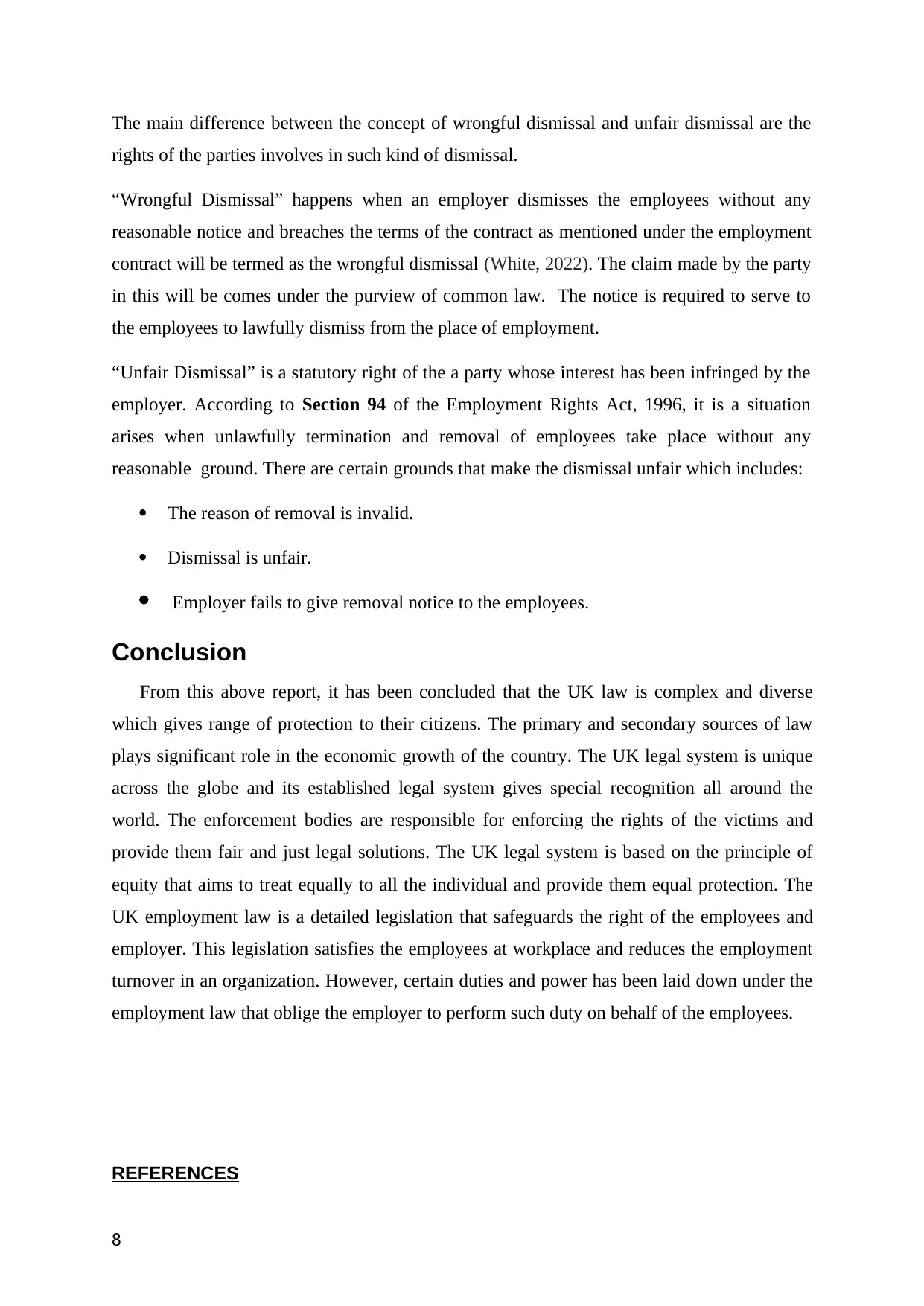
The main difference between the concept of wrongful dismissal and unfair dismissal are the
rights of the parties involves in such kind of dismissal.
“Wrongful Dismissal” happens when an employer dismisses the employees without any
reasonable notice and breaches the terms of the contract as mentioned under the employment
contract will be termed as the wrongful dismissal (White, 2022). The claim made by the party
in this will be comes under the purview of common law. The notice is required to serve to
the employees to lawfully dismiss from the place of employment.
“Unfair Dismissal” is a statutory right of the a party whose interest has been infringed by the
employer. According to Section 94 of the Employment Rights Act, 1996, it is a situation
arises when unlawfully termination and removal of employees take place without any
reasonable ground. There are certain grounds that make the dismissal unfair which includes:
The reason of removal is invalid.
Dismissal is unfair.
Employer fails to give removal notice to the employees.
Conclusion
From this above report, it has been concluded that the UK law is complex and diverse
which gives range of protection to their citizens. The primary and secondary sources of law
plays significant role in the economic growth of the country. The UK legal system is unique
across the globe and its established legal system gives special recognition all around the
world. The enforcement bodies are responsible for enforcing the rights of the victims and
provide them fair and just legal solutions. The UK legal system is based on the principle of
equity that aims to treat equally to all the individual and provide them equal protection. The
UK employment law is a detailed legislation that safeguards the right of the employees and
employer. This legislation satisfies the employees at workplace and reduces the employment
turnover in an organization. However, certain duties and power has been laid down under the
employment law that oblige the employer to perform such duty on behalf of the employees.
REFERENCES
8
rights of the parties involves in such kind of dismissal.
“Wrongful Dismissal” happens when an employer dismisses the employees without any
reasonable notice and breaches the terms of the contract as mentioned under the employment
contract will be termed as the wrongful dismissal (White, 2022). The claim made by the party
in this will be comes under the purview of common law. The notice is required to serve to
the employees to lawfully dismiss from the place of employment.
“Unfair Dismissal” is a statutory right of the a party whose interest has been infringed by the
employer. According to Section 94 of the Employment Rights Act, 1996, it is a situation
arises when unlawfully termination and removal of employees take place without any
reasonable ground. There are certain grounds that make the dismissal unfair which includes:
The reason of removal is invalid.
Dismissal is unfair.
Employer fails to give removal notice to the employees.
Conclusion
From this above report, it has been concluded that the UK law is complex and diverse
which gives range of protection to their citizens. The primary and secondary sources of law
plays significant role in the economic growth of the country. The UK legal system is unique
across the globe and its established legal system gives special recognition all around the
world. The enforcement bodies are responsible for enforcing the rights of the victims and
provide them fair and just legal solutions. The UK legal system is based on the principle of
equity that aims to treat equally to all the individual and provide them equal protection. The
UK employment law is a detailed legislation that safeguards the right of the employees and
employer. This legislation satisfies the employees at workplace and reduces the employment
turnover in an organization. However, certain duties and power has been laid down under the
employment law that oblige the employer to perform such duty on behalf of the employees.
REFERENCES
8
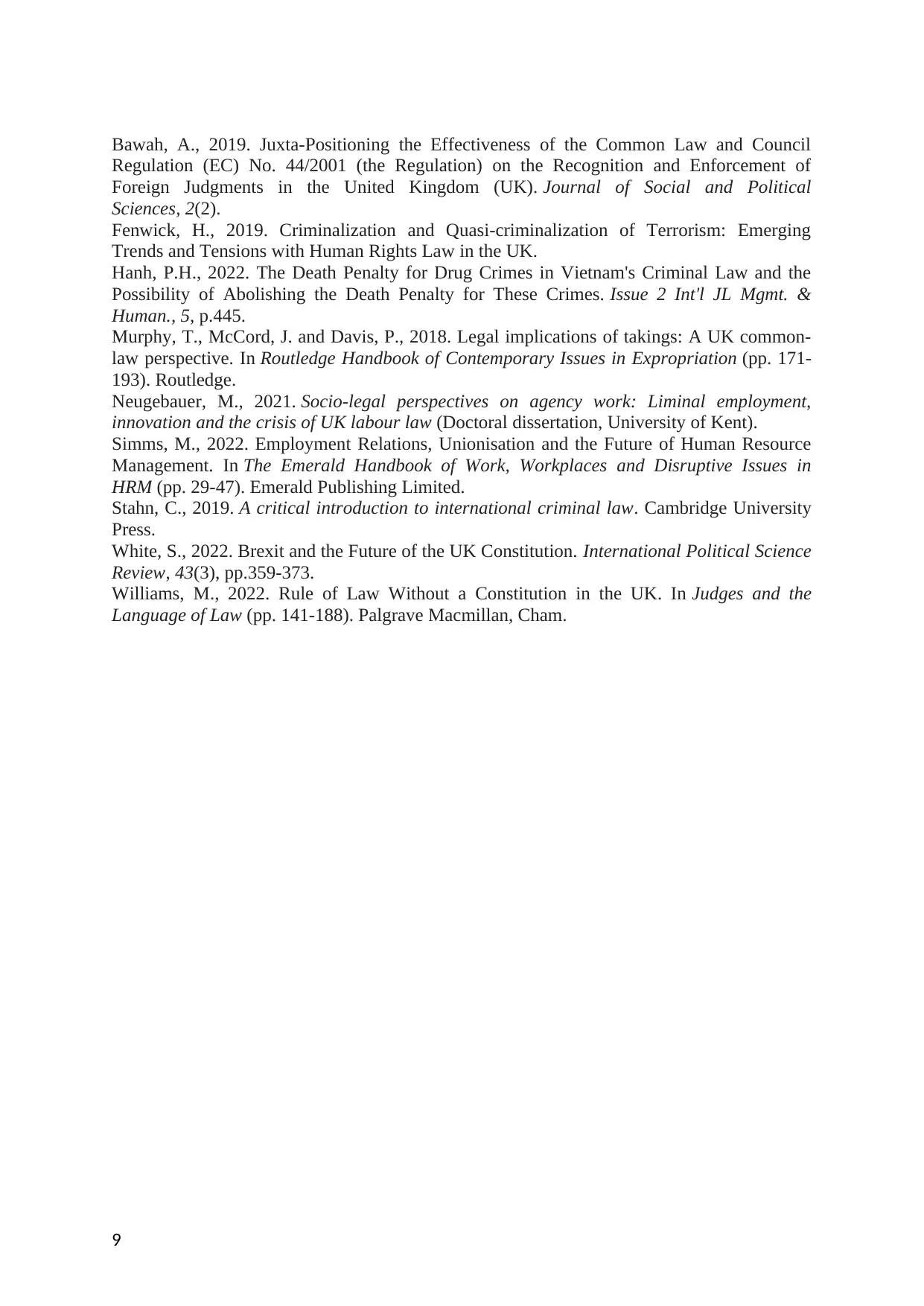
Bawah, A., 2019. Juxta-Positioning the Effectiveness of the Common Law and Council
Regulation (EC) No. 44/2001 (the Regulation) on the Recognition and Enforcement of
Foreign Judgments in the United Kingdom (UK). Journal of Social and Political
Sciences, 2(2).
Fenwick, H., 2019. Criminalization and Quasi-criminalization of Terrorism: Emerging
Trends and Tensions with Human Rights Law in the UK.
Hanh, P.H., 2022. The Death Penalty for Drug Crimes in Vietnam's Criminal Law and the
Possibility of Abolishing the Death Penalty for These Crimes. Issue 2 Int'l JL Mgmt. &
Human., 5, p.445.
Murphy, T., McCord, J. and Davis, P., 2018. Legal implications of takings: A UK common-
law perspective. In Routledge Handbook of Contemporary Issues in Expropriation (pp. 171-
193). Routledge.
Neugebauer, M., 2021. Socio-legal perspectives on agency work: Liminal employment,
innovation and the crisis of UK labour law (Doctoral dissertation, University of Kent).
Simms, M., 2022. Employment Relations, Unionisation and the Future of Human Resource
Management. In The Emerald Handbook of Work, Workplaces and Disruptive Issues in
HRM (pp. 29-47). Emerald Publishing Limited.
Stahn, C., 2019. A critical introduction to international criminal law. Cambridge University
Press.
White, S., 2022. Brexit and the Future of the UK Constitution. International Political Science
Review, 43(3), pp.359-373.
Williams, M., 2022. Rule of Law Without a Constitution in the UK. In Judges and the
Language of Law (pp. 141-188). Palgrave Macmillan, Cham.
9
Regulation (EC) No. 44/2001 (the Regulation) on the Recognition and Enforcement of
Foreign Judgments in the United Kingdom (UK). Journal of Social and Political
Sciences, 2(2).
Fenwick, H., 2019. Criminalization and Quasi-criminalization of Terrorism: Emerging
Trends and Tensions with Human Rights Law in the UK.
Hanh, P.H., 2022. The Death Penalty for Drug Crimes in Vietnam's Criminal Law and the
Possibility of Abolishing the Death Penalty for These Crimes. Issue 2 Int'l JL Mgmt. &
Human., 5, p.445.
Murphy, T., McCord, J. and Davis, P., 2018. Legal implications of takings: A UK common-
law perspective. In Routledge Handbook of Contemporary Issues in Expropriation (pp. 171-
193). Routledge.
Neugebauer, M., 2021. Socio-legal perspectives on agency work: Liminal employment,
innovation and the crisis of UK labour law (Doctoral dissertation, University of Kent).
Simms, M., 2022. Employment Relations, Unionisation and the Future of Human Resource
Management. In The Emerald Handbook of Work, Workplaces and Disruptive Issues in
HRM (pp. 29-47). Emerald Publishing Limited.
Stahn, C., 2019. A critical introduction to international criminal law. Cambridge University
Press.
White, S., 2022. Brexit and the Future of the UK Constitution. International Political Science
Review, 43(3), pp.359-373.
Williams, M., 2022. Rule of Law Without a Constitution in the UK. In Judges and the
Language of Law (pp. 141-188). Palgrave Macmillan, Cham.
9
⊘ This is a preview!⊘
Do you want full access?
Subscribe today to unlock all pages.

Trusted by 1+ million students worldwide
1 out of 9
Related Documents
Your All-in-One AI-Powered Toolkit for Academic Success.
+13062052269
info@desklib.com
Available 24*7 on WhatsApp / Email
![[object Object]](/_next/static/media/star-bottom.7253800d.svg)
Unlock your academic potential
Copyright © 2020–2026 A2Z Services. All Rights Reserved. Developed and managed by ZUCOL.
